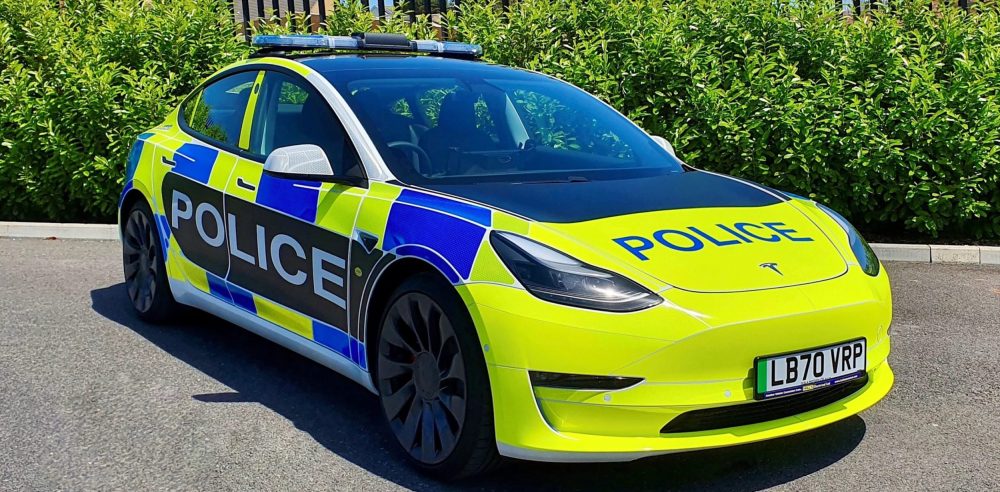
Tesla has released findings from its test program of a Model 3 that the automaker custom-built as a police patrol car in the UK.
Several electric vehicles, especially Tesla vehicles, are becoming increasingly popular with police departments and emergency services.
Any type of use that requires a lot of mileage is going to benefit greatly from going electric with important gas and maintenance savings.
We previously reported on the Bargersville Police Department in Indiana, which purchased several Tesla Model 3 vehicles. It found after the first full year of using the Tesla Model 3, they had already saved over $6,000.
In most cases, police departments purchase the Model 3 vehicles and modify them to turn the electric cars into police patrol cars.
But earlier this year, Tesla decided to build its own Model 3 police cars for testing at police departments in the UK.

Now Max Toozs-Hobson, account manager and emergency services lead at Tesla, said the vehicles have now been in “initial trials with the police” for nine months that they have been “getting some great results.”
He shared the findings on LinkedIn:
- It’s achievable to do over 200 miles of Blue Light advance driving with the Model 3. The average blue light run in the UK is about 7-15 minutes, The longest run in our cars has been over 4 hours on active deployment under advanced driving conditions.
- The auxiliary systems have minimal impact on range, ANPR for 3 hours would take less than a few mile of range off the car. LED lights could run for days off the battery pack.
- Chill mode & speed limiting allows the cars to be limited, allowing the possibility for split crews to drive the car on shift allowing for all officers to utilize the car.
- Light bars are like running with a parachute! Integrating lights into the car cabin does not affect our drag coefficiency and requires no holes to be drilled into the roof which has a negative affect on the cars residual values.
- Charging on shift works! last week I joined a traffic unit who got into the car with just 80 miles of range. We stopped at a V3 Supercharger and gained 70% power in less than 20 minutes. This gave us another 5-6 hours of driving for the shift. Plus this fill up cost less than £20.
- Public response to seeing our active units has been mind-blowing, the press articles have been positive as well. As an engagement tool we’re seeing incredible results.
- Brakes wear has been minimal, after 10,000 miles of driving the first set of pads still had 15-20% use still in them. Tires are the same as I.C.Es and need replacing at around 8,000 miles.
- After 15,000 miles the only maintenance has been brakes and tires, no annual service schedules mean minimal running costs, time off the road and competitive total cost of ownership.
- Tesla software updates and systems offer new ways to police, the ability to send directions to the car via systems such as what3words and Google maps will allow control rooms to send direct directions to a job. Dash cam, GPS tracking & App access offer unique potential to our cars as well.
- Our delivery lead times and body shop offer industry leading deployment for forces to deploy new units and repair.
Subscribe to Electrek on YouTube for exclusive videos and subscribe to the podcast.
Author: Fred Lambert
Source: Electrek



